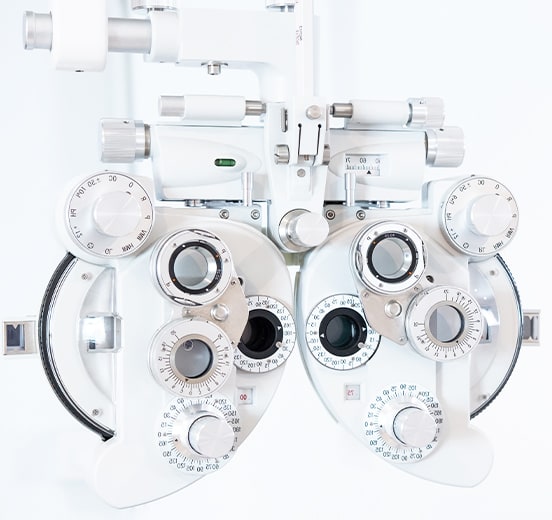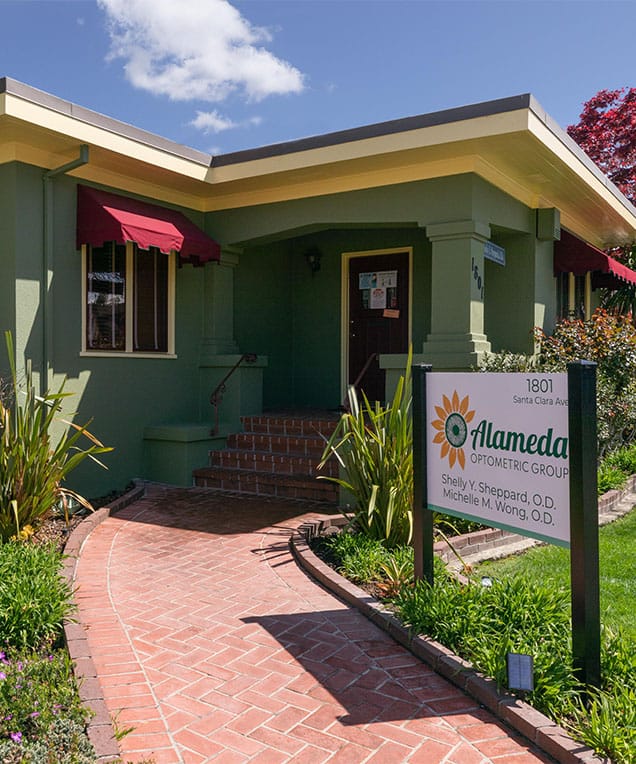Preserving Your Eye Health Is Our Legacy
Our approach to supporting your family’s eyes is anything but “traditional.”
When you walk through our doors, you’ll sense our commitment to caring, compassionate eye care. And you’ll also see that we’re ready to support your entire family with the help of modern diagnostic technology and personalized treatment and management plans.
Whether this is your first appointment with us or you’ve been a member of our community for decades, you can always count on the team at Alameda Optometric Group to keep the focus on you and your eye health. Book your next appointment today!


Why Your Eye Health Matters
Your vision and eye health are intrinsically connected.
However, it’s still possible to develop eye health problems you might not know about. These issues can develop for years without noticeable symptoms, but they eventually can lead to permanent vision problems if they’re not managed.
Regular, routine eye exams are the key to understanding your eye health and supporting your vision. Our team looks at numerous structures responsible for providing your vision during your eye exam, checking them for issues that you may not be aware of yet. By detecting potential problems as early as possible, our team can help preserve and manage your vision throughout your life.
How We Detect Eye Diseases & Conditions
Eye diseases and conditions can affect various aspects of your eye, including your:
During your eye exam, we may use a combination of technologies to get a full view of your eye health. These processes are designed to be as comfortable as they are comprehensive, and we’ll be happy to walk you through their unique qualities when you come in for an eye exam.
Optical Coherence Tomography
Optical coherence tomography (OCT) is an imaging technology we use to capture highly-detailed cross-sectional images of your retina and its various layers.
We may also use a different version of the device, known as an anterior segment OCT, to collect information about your cornea and the issues affecting it.
Fundus Photography
Fundus photography is a high-powered imaging device that can provide us with detailed colored images of your eye’s fundus—the area at the back of your eye that includes the retina, macula, optic disc, and retinal blood vessels.
Tonometry
Tonometry is a common technique used to measure your eye’s internal pressure levels, also known as intraocular pressure or IOP. The techniques we use utilize a small probe that gently presses against the eye to measure its resistance.
There are 2 types of tonometry devices we may use:
Corneal Topography
Corneal topography is a process that analyzes and maps your cornea. This device helps detect various corneal conditions as well as find suitable contacts during a contact lens exam and fitting.
Managing Your Eye Health Is a Unique Process
Every eye disease and condition affects every person differently.
Because of this, we develop our treatment and management strategies according to individual needs. While most eye diseases and conditions have no cure, our team may be able to help manage its development with prescription medication, surgery, or recommending lifestyle changes.
However, early detection is vital to managing these problems. If you are at risk of developing an eye health issue, make sure you have regular eye exams.
Glaucoma
Glaucoma is a group of eye diseases that affect your optic nerve, a part of your eye responsible for transporting information from your retina to your brain to provide you with sight. In most cases, glaucoma is typically associated with high IOP levels, but some versions of the disease may develop even when your IOP levels are within a normal range.
The 3 most common types of glaucoma include:
- Open-angle glaucoma, which can develop when blockages form in your eye’s natural drainage system.
- Closed-angle or angle-closure glaucoma, which can occur when the drainage angle between your cornea and iris closes to cause a rapid increase in IOP levels.
- Normal-tension glaucoma, which can develop even if your IOP levels are within normal ranges.
Our team can help detect signs of glaucoma by measuring your IOP with tonometry techniques or observing your optic disc for issues.
Age-Related Macular Degeneration
Age-related macular degeneration (AMD) is a common eye disease that affects the macula, the centermost part of the retina responsible for providing your central vision. AMD most commonly develops in older adults and is known as a leading cause of vision loss for people 55 years old and older.
There are 2 types of AMD:
- Dry AMD, which occurs when small deposits of drusen slowly cause the macula to thin as you age.
- Wet AMD, which can occur when abnormal blood vessels leak fluids under the macula, causing it to swell.
Observing your macula during an eye exam can help our team detect early signs of AMD.
Diabetic Eye Disease
Diabetes is a common health concern many Americans face, and it can have a significant effect on your eye health.
Retinal blood vessels damaged by high blood sugar levels can leak fluids over time, affecting the retina and increasing the risk of several diseases and conditions. The most common include diabetic retinopathy and diabetic macular edema.
Please visit our Diabetic Eye Exams page to learn more about these issues.
Cataracts
Cataracts are common in adults, and the risk of developing them can increase as you age.
Cataracts affect a part of your eye called the crystalline lens. As they develop, they can cause the lens to become hazy or milky, an issue that can obstruct your vision as you age.
Glasses and contacts may help correct vision problems caused by cataracts, but cataract surgery is the only way to treat the issue and restore the quality of sight.
Our Team Is Ready To Help
We’re here to answer your questions, address your concerns, and find suitable ways to help manage your eye health and preserve your vision.If you’re looking for help, look no further than the team at Alameda Optometric Group. Book your next appointment with us today.
Our Location
Our practice is located in a converted house on the corner of Santa Clara Ave and Union Street. Street parking is available on either side of our practice. If you have any trouble finding us, give us a call. We can’t wait to see you!

Our Address
- 1801 Santa Clara Ave
- Alameda, CA 94501
Contact Information
- 510-521-2015
- 510-521-2123
- [email protected]
Hours of Operation
- Monday: 8:45 AM – 5:00 PM
- Tuesday: 8:45 AM – 5:00 PM
- Wednesday : 8:45 AM – 5:00 PM
- Thursday : 8:45 AM – 5:00 PM
- Friday : 8:45 AM – 5:00 PM
- Saturday: By Appointment
- Sunday: Closed
Closed for lunch 12:30 PM – 1:30 PM
Our Brands










Our Testimonials
I have been a patient of the Alameda Optometrist Group for years and have been extremely pleased. Thank you Dr Shelly Sheppard and staff for all your good care. Thank you Jan for always being so patient with me on deciding what frames look better. I highly recommend your office to anyone with optometric needs.
Judy Harris
Dr. Sheppard was very thorough in the examination and her staff was very helpful. There was three of us and they took care of all three of us with the same thoughtfulness and made sure we were comfortable. I would highly recommend Alameda optometrist to my family and friends.
Daniel Rodriguez
Nothing but the best every time I come here thank you all so much I love my glasses.
Chalice Ironside
AOG is like a good neighbour friendly type group. The facility is homey, orderly, and high covid-19 protected. One can tell the Drs. And staff are expertly trained as the service is efficient and courteous. Comfortable place.






